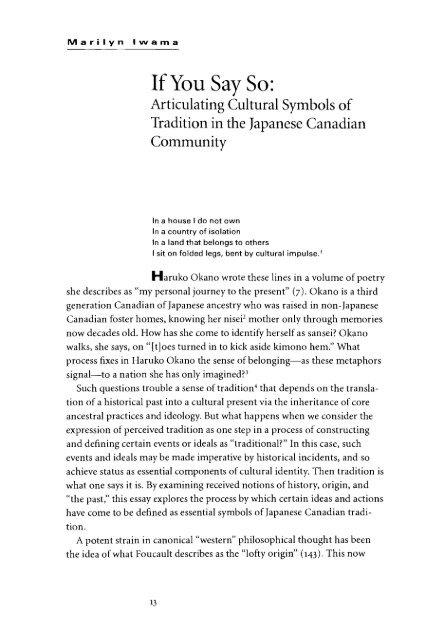To All Appearances A Lady - University of British Columbia
To All Appearances A Lady - University of British Columbia
To All Appearances A Lady - University of British Columbia
Create successful ePaper yourself
Turn your PDF publications into a flip-book with our unique Google optimized e-Paper software.
Marilyn<br />
I w a m a<br />
IfYouSaySo:<br />
Articulating Cultural Symbols <strong>of</strong><br />
Tradition in the Japanese Canadian<br />
Community<br />
In a house I do not own<br />
In a country <strong>of</strong> isolation<br />
In a land that belongs to others<br />
I sit on folded legs, bent by cultural impulse. 1<br />
Haruko Okano wrote these lines in a volume <strong>of</strong> poetry<br />
she describes as "my personal journey to the present" (7). Okano is a third<br />
generation Canadian <strong>of</strong> Japanese ancestry who was raised in non-Japanese<br />
Canadian foster homes, knowing her nisei 2 mother only through memories<br />
now decades old. How has she come to identify herself as sansei? Okano<br />
walks, she says, on "[t]oes turned in to kick aside kimono hem." What<br />
process fixes in Haruko Okano the sense <strong>of</strong> belonging—as these metaphors<br />
signal—to a nation she has only imagined? 3<br />
Such questions trouble a sense <strong>of</strong> tradition" that depends on the translation<br />
<strong>of</strong> a historical past into a cultural present via the inheritance <strong>of</strong> core<br />
ancestral practices and ideology. But what happens when we consider the<br />
expression <strong>of</strong> perceived tradition as one step in a process <strong>of</strong> constructing<br />
and denning certain events or ideals as "traditional?" In this case, such<br />
events and ideals may be made imperative by historical incidents, and so<br />
achieve status as essential components <strong>of</strong> cultural identity. Then tradition is<br />
what one says it is. By examining received notions <strong>of</strong> history, origin, and<br />
"the past," this essay explores the process by which certain ideas and actions<br />
have come to be denned as essential symbols <strong>of</strong> Japanese Canadian tradition.<br />
A potent strain in canonical "western" philosophical thought has been<br />
the idea <strong>of</strong> what Foucault describes as the "l<strong>of</strong>ty origin" (143). This now

















